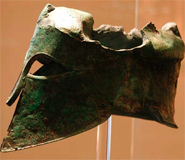In 490 BC, an eventful clash of civilizations took place at Marathon in Greece. An invading Persian army, then one of the world's paramount powers, was routed by an outnumbered force of Greeks. Against all odds, around 10,000 Greeks out-manoeuvred around 25,000 Persians. On the Plain of Marathon visitors can still see a burial mound which is believed to cover the 192 Athenian citizens who died that day 2,500 years ago.
Some ancient writers tell of a run from Marathon to Athens after the battle to report news of the victory (around 42km), a story that provides the template for modern-day marathons. Other writers include stories of a much longer run by a man called Philippides, who ran from Athens to Sparta to request the Spartans' help against the impending Persian threat, a distance of around 250km (approximately 155 miles).
The talk, entitled 'Pan(demonium): Why Marathon still matters 2,500 Years on', presented by Paul Cartledge, Leventis Professor of Greek Culture at the University of Cambridge, examines the legend of the first ever marathon and the significance of the battle itself.
Although many of the details of the battle remain unclear and controversial, we know enough to appreciate that the Battle of Marathon was an extraordinarily important event in history.
Dr Jessica Priestley from the University’s Institute of Greece, Rome and the Classical Tradition, who has organised the event, said: “The Battle of Marathon is one of the most momentous events in history. Had the Athenians and Plataeans lost their fight, major cultural developments in ancient Greece which still impact on us today, including democracy itself, might have been nipped in the bud.“
The event, hosted by the University of Bristol’s Institute of Greece, Rome and the Classical Tradition, is being held at the Tyndall Lecture Theatre, HH Wills Physics Laboratory, Tyndall Avenue, University of Bristol on Monday 9 May between 1 to 2 pm. Entrance is free.
